Deng Tong, Golden Finance
After Trump's tariff stick fell last week, the financial market reaction continued to ferment.
On April 7, 2025, the yield on the 10-year U.S. Treasury bond fell by about 10 basis points to 3.904% in early trading. The three major A-share indices continued to fall, with the ChiNext Index falling by 10%, the Shenzhen Component Index falling by 8.3%, and the Shanghai Composite Index falling by 6.6%. More than 860 stocks in the entire market fell to the limit. European stock index futures continued to fall last week, with the European STOXX 50 Index futures falling by 4.3%, the German DAX Index futures falling by 5.0%, and the British FTSE 100 Index futures falling by 4.1%. The Nikkei 225 Index and the Australian S&P/ASX200 Index fell further, with intraday declines of 6%, and the Nikkei 225 Index and the Topix Index futures suspended trading after a sharp drop. Spot gold fell below $3,000/ounce for the first time since March 21, down 1.28% on the day. The main stock index in the Gulf region fell by more than 5.5%, the biggest drop since 2020. Saudi Aramco's stock price fell by 6.2%, and its market value evaporated by more than $90 billion.
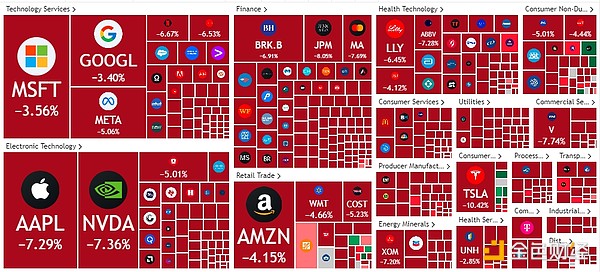
The stock market is bleak
The crypto market is not immune, and the crypto market is all red. Today's Fear and Greed Index dropped to 23, and the level changed from fear to extreme panic. Many mainstream cryptocurrencies recorded double-digit declines: BTC is now at $78,973.52, down 5.4% in 24 hours. Three hours ago, it even fell below $78,000, with a low of $77,284.23.
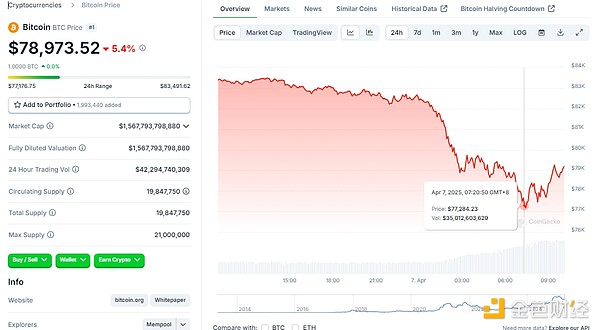
ETH fell below the $1,600 mark, at $1,595.76, down 11.9% on the day. SOL was at $107.21, down 10.9% on the day.
Due to the particularly bleak ETH market, many whale positions were liquidated. According to the monitoring of on-chain analyst Ember, with this wave of decline, the whale position with a liquidation line of 67,500 ETH (US$105 million) loan positions at US$1,650 was completely liquidated, which also contributed to the further decline of ETH. He actually added 2,160 ETH of collateral at 1 a.m. to lower the liquidation line, but ETH fell all the way, and his ETH position was finally liquidated at 6 a.m. to pay off his 74.4 million DAI loan.
Another whale holding 57,000 ETH was almost liquidated at the same price as the 67,500 ETH position. Because he actively reduced his position a few days ago, he barely avoided risks. At present, his position is still on the edge of the liquidation line, and it is expected that he will need to continue to reduce his position to reduce risks.
1. Is Trump deliberately manipulating the market to sell?
Trump posted on his social media platform that the United States has huge fiscal deficits with China, the European Union and other countries, and the only solution is to impose tariffs, which have now brought the United States tens of billions of dollars in revenue. He criticized the widening of the U.S. trade deficit with the above-mentioned countries during the Biden administration and promised to quickly reverse the situation, once again emphasizing that tariffs are "a very beautiful thing" for the United States.
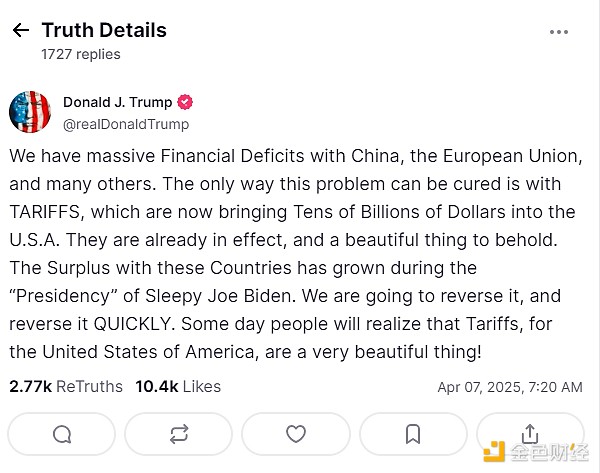
As U.S. stock futures plummeted, Trump said that he did not deliberately manipulate the market to sell off, and he had talked with European and Asian leaders about tariffs. He also said that he could not predict what would happen in the market. When asked about the market performance, he said that sometimes the market must "take medicine."
U.S. Commerce Secretary Howard Lutnick said that the United States would not postpone the imposition of tariffs, and the "reciprocal tariffs" would take effect on April 9 and would last for several days. In addition, Lutnick said that the United States must include uninhabited islands where penguins "live" in the scope of tariffs to prevent certain countries from trying to take advantage of loopholes. Kevin Hassett, director of the White House National Economic Council, said that the stock market crash was not a deliberate strategy of President Donald Trump. Earlier, Trump shared a link to a video on his social media platform "Real Social" that claimed that the president deliberately caused the market to plummet as part of his broader economic plan. When repeatedly asked whether Trump was intentionally orchestrating a market sell-off, Hassett responded: "He's not trying to crash the market. He's trying to do good for the American worker." "It's not (the administration's) strategy to crash the market," Hassett said. Asset manager Anthony Pompliano recently speculated that the U.S. president is deliberately crashing the capital markets to force him to cut interest rates and reduce the cost of servicing U.S. Treasury debt.
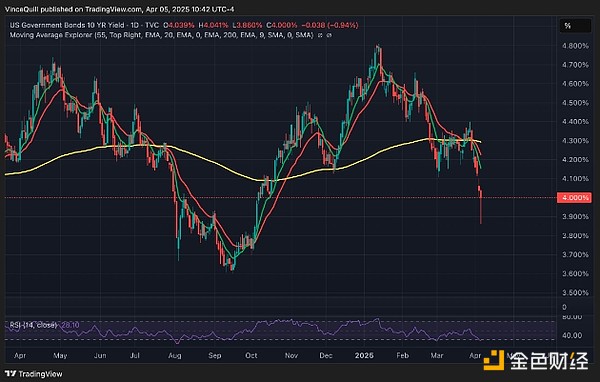
The 10-year U.S. Treasury bond rate has been falling since the start of Trump's second term. Source: TradingView
2. How do other countries respond to the tariff stick?
The British government said that British Prime Minister Starmer had a call with Canadian Prime Minister Carney. The two sides agreed that it is vital to maintain free and open trade between like-minded countries. Prime Minister Carney reiterated Canada's commitment to play an active role in the "Coalition of the Willing". The two leaders also discussed how to work together to maintain global economic stability after the US announced relevant measures. The British government stressed that a full-scale trade war is not in anyone's interest. Prime Minister Starmer and Prime Minister Carney reached a consensus on this. The European Commission released a message saying that on the same day, European Commission President von der Leyen spoke with British Prime Minister Starmer and discussed trade issues. During the call, von der Leyen pointed out that the tariff measures announced by the Trump administration of the United States on April 2 will cause damage to all countries in direct and indirect ways, including affecting the world's poorest countries. Von der Leyen said the tariffs marked a major turning point in U.S. policy. She said that while the EU remained committed to negotiations with the United States, it was ready to defend its interests with corresponding countermeasures if necessary. EU countries will seek to present a united front in the coming days to fight back against Trump's tariffs. The EU may approve a first set of targeted countermeasures on U.S. imports worth up to $28 billion, including dental floss and diamonds. The European Commission will present to member states later on Monday a list of U.S. products hit by additional tariffs in response to Trump's steel and aluminum tariffs, rather than broader reciprocal tariffs. Luxembourg will host the first EU-wide political meeting since Trump announced the comprehensive tariffs early on Monday, when ministers responsible for trade from the 27 EU member states will exchange views on the impact of the tariffs and how best to respond. EU diplomats said the main purpose of the meeting was to convey a consistent message that it hopes to negotiate with the United States on the removal of tariffs, but is prepared to take countermeasures if the negotiations fail.
3. Will the tariff policy affect the lives of the American people?
In response to the latest tariff policy announced by the United States, the BBC, the Associated Press and other reports said that the new U.S. tariff policy will push up the prices of almost all daily necessities for the American people, especially clothing and food, and harm the interests of American consumers and businesses. The Yale University Budget Lab previously analyzed that the US tariff policy may cause the overall US inflation rate to rise by 2.3% this year, which is equivalent to a loss of $3,800 for each ordinary American family.
White House National Economic Council Director Hassett believes that "tariffs will lead to lower US consumer prices."
Former US Treasury Secretary Lawrence Summers disagrees with Hassett's statement. He believes that US President Trump's tariff policy is the biggest self-inflicted wound inflicted on the US economy in history.
Summers said that tariffs will lead to rising prices, exacerbating the inflation rate, which will in turn reduce people's spending power and mean fewer job opportunities.
Fourth, what do industry insiders think of this market decline?
In an interview with CBS, U.S. Democratic Senator Bernie Sanders said that the United States under Trump's leadership is facing "unprecedented danger" and is rapidly moving towards oligarchy. He said this means that the U.S. government is being managed by the billionaire class and serves the billionaire class.
BitMEX co-founder Arthur Hayes wrote on the X platform that a large part of Trump's supporters do not hold a lot of financial assets. He believes that those who do not hold stocks have a clear schadenfreude towards those who hold stocks, so Trump can firmly advance the tariff policy and be confident that this position is still widely popular among his core voter groups. . . . Tariffs will eliminate the status of US Treasuries and US stocks as global reserve assets. . . . For those who want to adapt to the restoration of pre-1971 trade relations, buy gold, gold miners and BTC. . . . BTC holders need to learn to like tariffs, and maybe we finally break the association with Nasdaq and can turn to the purest form of fiat liquidity smoke alarm.
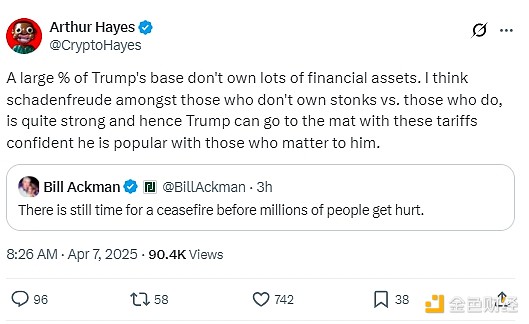
Goldman Sachs cut its US fourth-quarter 2025 GDP growth forecast to 0.5% and raised the 12-month recession probability to 45% from 35%, citing a sharp tightening of financial conditions, foreign consumer boycotts, and a continued surge in policy uncertainty, which could curb capital spending by more than we previously assumed.
Traders on the Karsh prediction market believe that there is a 61% chance of a U.S. recession in 2025.
Simon Gerovich, CEO of Metaplanet, a Japanese listed company, tweeted, "On days when Bitcoin falls, it's easy to focus only on price. But this can be a moment to test and cultivate conviction. Volatility is also a natural aspect of a truly rare, diversified asset with long-term potential. Keep an open mind, understand how it works, and keep learning."
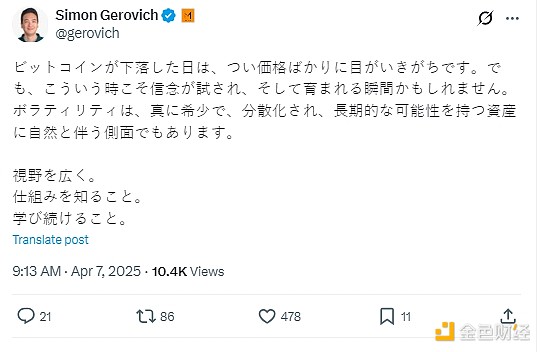
Gold advocate and economist Peter Schiff responded to Pierre Rochard, vice president of Riot Platforms, on his view "ETH/BTC A complete retracement challenges the view that new cryptocurrencies can surpass Bitcoin due to greater utility," commented Jeff Park, an analyst at Bitwise, who said that US President Donald Trump's trade policies will trigger global macroeconomic turmoil and short-term financial crises, which will ultimately lead to wider adoption of Bitcoin as a store of value asset. “The costs of the tariffs will likely be borne through higher inflation, which will be borne by the US and its trading partners, but foreign countries will be hit much harder in relative terms. These countries will have to find a way to fend off weak economic growth.” Writer and financial commentator Holger Zchaepitz summed up X’s response: “The tariffs announced by Trump this week have wiped $8.2 trillion off the value of the stock market – more than the worst week of the 2008 financial crisis.” Sean Callow, senior currency analyst at ITC Markets in Sydney, said: 192);">“The only real circuit breaker for Asian stock markets was President Trump’s rhetoric, with little sign that the market sell-off has troubled him enough to cause him to reconsider policy positions he has believed in for decades.” Investors had previously believed that the loss of trillions of dollars in wealth and the potential damage to the economy would cause Trump to reconsider his plans.
Bitcoin proponent Max Keiser even predicted that BTC would reach $220,000 by the end of the month. “A 1987-style super crash will push Bitcoin to $220,000 this month as trillions of wealth seek the ultimate safe haven: Bitcoin.”
Famous trader Daan Crypto Trades: “BTC volatility is getting lower and lower, while the stock VIX (volatility index) has closed at its highest level since the 2020 COVID-19 crash.” “This is unheard of, and due to this compression, I am very confident that cryptocurrencies will also see significant volatility next week. I think whether it goes up or down depends on whether the stock market can bottom out early this week.”
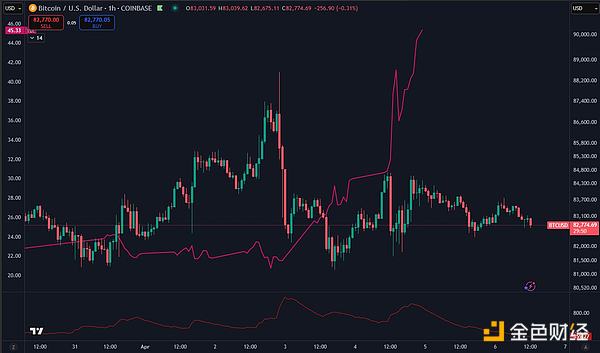 He told X’s followers: “This looks no different than the ETF sell-off and the August 2024 crash.I’m waiting for a weekly return to $92,000 to confirm the uptrend.”
He told X’s followers: “This looks no different than the ETF sell-off and the August 2024 crash.I’m waiting for a weekly return to $92,000 to confirm the uptrend.”
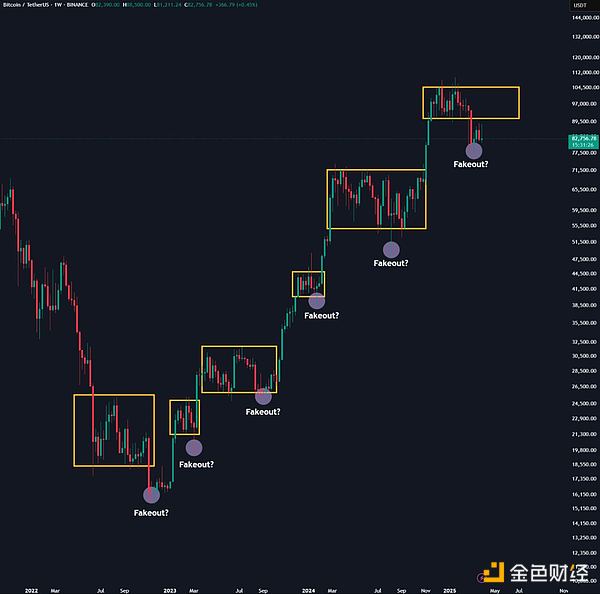
BTC/USDT 1-week chart. Source: Cas Abbe/X
V. Who’s buying the dip?
El Salvador increased its holdings by 1 bitcoin during this decline, and its total holdings now stand at 6,139.18 bitcoins, with a total value of $488 million.
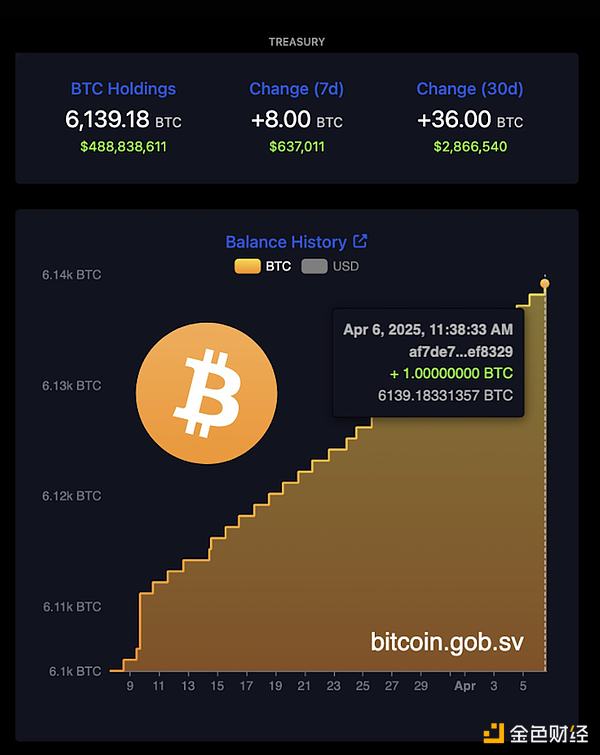
According to Onchain Lens monitoring, two major addresses have recently purchased large amounts of ETH. Among them, the "7 Sibling" address spent $41.78 million to buy 25,092 ETH at an average price of $1,665; another new wallet used $8.13 million in DAI to buy 4,983.56 ETH at an average price of $1,631.
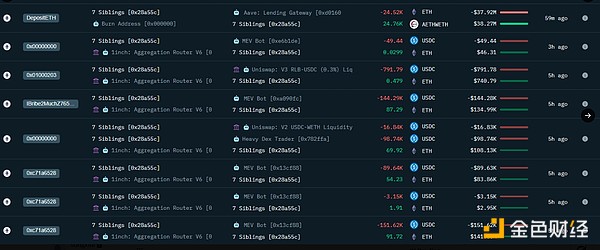
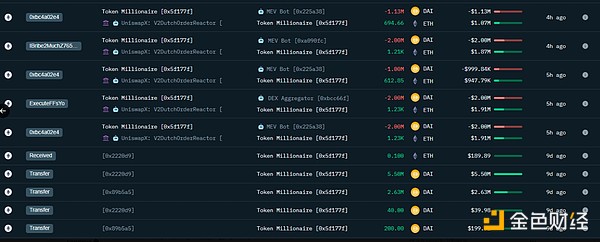
 Joy
Joy







 He told X’s followers: “This looks no different than the ETF sell-off and the August 2024 crash.
He told X’s followers: “This looks no different than the ETF sell-off and the August 2024 crash.






